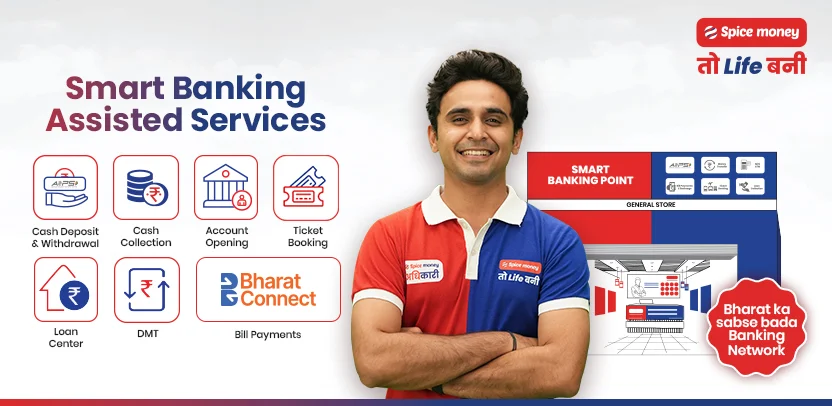Access to basic financial services is still limited in many rural and remote areas. This is where the role of a Banking Correspondent Agent becomes important. Acting as a bridge between financial institutions and underserved populations, a Banking Correspondent helps deliver essential banking services without needing a full-fledged branch. If you’re looking for a self-employment opportunity that also supports financial inclusion, this will walk you through how to get started.

Who Is a Banking Correspondent Agent?
A Banking Correspondent Agent is an individual authorized by a bank or financial institution to provide basic banking services in areas where access to bank branches is limited. These services can include account opening, cash deposits and withdrawals, fund transfers, balance inquiries, and more.
Agents operate locally within villages, towns, or semi-urban areas, using a point-of-sale device, mobile device, or micro-ATM to carry out banking tasks. They are a vital part of efforts to expand the reach of formal financial services to every corner of the country.
Key Responsibilities of a Banking Correspondent Agent
A Banking Correspondent Agent handles a range of day-to-day responsibilities aimed at bringing financial services closer to people’s homes. Below are the common services offered:
Banking Transactions
- Accepting and disbursing cash for deposits and withdrawals
- Facilitating money transfers between accounts
- Providing mini-statements or balance inquiries
Financial Inclusion Support
- Assisting customers in opening savings or recurring deposit accounts
- Helping people access social security benefits or government subsidies
- Educating the local population on the importance of formal banking
Customer Identification and Onboarding
- Conducting KYC (Know Your Customer) procedures
- Capturing biometric data if required
- Verifying identities before completing any banking process
Eligibility Criteria to Become a Banking Correspondent Agent
Not everyone is eligible to become a Banking Correspondent Agent. However, the criteria are designed to be inclusive enough to allow people from different backgrounds to apply.
Basic Qualifications
- Should be at least 18 years old
- Should have passed minimum 10th standard (varies based on location)
- Ability to read and write in the local language is essential
- Basic computer or smartphone literacy is required
Preferred Profiles
- Local shopkeepers, retired teachers, small entrepreneurs, and youth
- Individuals with strong social ties in their communities
- Preference is often given to people who can operate from an accessible and secure location
Required Infrastructure and Tools
Before starting as a Banking Correspondent, it’s important to have basic infrastructure and digital tools in place.
Space
- A small shop or kiosk where people can visit safely
- The place should be easily accessible to the local population
Digital Devices
- A mobile phone or tablet with internet access
- Micro-ATM or POS device with biometric scanner
- Printer for transaction slips (if needed)
Connectivity
- Reliable internet or mobile data connection
- Power backup (if possible) to ensure service availability during power outages
Registration and Onboarding Process
To officially start working as a Banking Correspondent Agent, you will need to go through a registration and training process. Here is a general outline:
Application
- Submit an application to a financial institution or designated business partner
- Provide valid identity proof, address proof, and educational certificates
Background Check
- The institution may conduct a basic verification of your credentials and criminal record
- Field visits or interviews may be conducted before approval
Training and Certification
- Training on operating devices, conducting secure transactions, and handling customer queries
- Guidelines on customer service, grievance redressal, and data security
- After training, a certification or onboarding document is issued
Earnings and Incentives
Being a Banking Correspondent Agent is typically a commission-based role. Your income depends on the number of transactions or services you provide.
Earning Sources
- Fixed commissions for account openings
- Variable fees for cash deposits, withdrawals, and fund transfers
- Monthly incentives based on transaction volume
Although the initial earnings may appear modest, consistent service and community trust can lead to a stable income stream over time.
Challenges Faced by Agents
While the role of a Banking Correspondent Agent can be rewarding, it does come with challenges:
- Connectivity issues in remote areas
- Cash handling risks and delays in settlements
- Convincing local populations to adopt formal banking methods
- Maintaining accurate records and managing customer expectations
Proper training and community engagement can help overcome most of these difficulties.
Growth Opportunities
Working as a Banking Correspondent opens up more opportunities in the financial services ecosystem. Some agents expand their operations to include:
- Insurance enrollment services
- Loan assistance and application support
- Utility bill payments and digital payment facilitation
Over time, some agents even grow into full-time financial service providers in their localities.
Conclusion
Becoming a Banking Correspondent Agent is more than just a job, it’s a responsibility that brings financial access to people who need it most. With the right training, infrastructure, and mindset, you can build a sustainable livelihood while helping your community grow financially. The journey may have its challenges, but the impact and personal satisfaction often outweigh the hurdles.
If you’re motivated to work independently, connect with your community, and play a role in expanding financial literacy and access, then starting as a Banking Correspondent is a strong step forward.